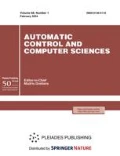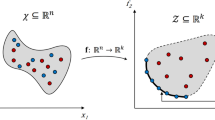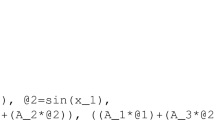Abstract
The main principles of the minimax method designed for solving energy consumption optimization problems in real-time embedded systems are presented. Results of comparing ways to minimize energy consumption in systems with on-line minimax and off-line DVS/DFS scheduling are given. In terms of energy consumption minimization, the minimax method is shown to ensure optimal division of the task into two subtasks. This method can be applied both to systems with tasks arbitrarily distributed in time and to periodic multitasking systems with rigid timing constraints.
Similar content being viewed by others
References
Weiser, M. et al., Scheduling for Reduced CPU Energy, Operating System Design Implementation, 1994, pp. 13–23.
Ishihara, T. and Yasuura, H., Voltage Scheduling Problem for Dynamically Variable Voltage Processors, Proceedings of the 1998 International Symposium on Low Power Electronics and Design, 1998, pp. 197–202.
Chandrasena, L. H., Chandrasena, P., and Liebelt, M. J., An Energy Efficient Rate Selection Algorithm for Voltage Quantized Dynamic Voltage Scaling, Proceedings of the 14th International Symposium on Systems Synthesis, 2001, pp. 124–129.
Mochocky, B., Hu, X. S., and Quan, G., A Realistic Variable Scheduling Model for Real-Time Applications, Proceedings of the 2000 IEEE/ACM International Conference on Computer-Aided Design, pp. 726–731.
Jejurikal, R. and Gupta, R., Energy Aware Task Scheduling with Task Synchronization for Embedded Real Time Systems, Proceedings of the International Conference on Computers, Architecture, and Synthesis for Embedded System, 2002, pp. 164–169.
Pering, T., Burd, T., and Brodersen, R., The Simulation of Dynamic Voltage Scaling Algorithms, ACM, 2000, pp. 76–81.
Baums, A. and Zaznova, N., Power Optimization of Embedded Real-Time Systems and Their Adaptability, Automatic Control and Computer Sciences, Allerton Press, Inc., 2008, vol. 42, no. 3, pp. 153–162.
Baums, A., The Real-Time System Energy Consumption Estimation for the Task Dynamic and Statistic Realization Scheduling, Scientific Proceedings of Riga Technical University, Computer Science, 2005, vol. 20, no. 5, pp. 36–41.
Pillai, P. and Shin, K.G., Real-time Dynamic Voltage Scaling for Low-Power Embedded Operating System, Proceedings of the ACM SIGOPS, October 2001, vol. 35, no. 5, pp. 89–102.
Duddani, A., Mueler, F., and Zhu, Y., Energy-Conserving Feedback EDF Scheduling for Embedded Systems with Real-Time Constraints, Proceedings of the LCTES’02, ACM, 2002, pp. 213–222.
Zhu, Y. and Mueler, F., Feedback EDF Scheduling Exploiting Hardware-Assisted Asynchronous Dynamic Voltage Scaling, Proceedings of the LCTES’05, ACM, 2005, pp. 203–212.
Liu, C.L. and Lyland, J.W., Scheduling Algorithms for Multiprogramming in a Real-Time Environment, J. ACM, 20 January, 1973, pp. 45–61.
Baums, A., Multitask Real-Time System Energy Consumption Using Minimax Method, Electronics and Electrical Engineering, 2007, vol. 77, no. 5, Kaunas Technologija, 2007, pp. 61–64.
Author information
Authors and Affiliations
Corresponding author
Additional information
Original Russian Text © A. Baums, 2009, published in Avtomatika i Vychislitel’naya Tekhnika, 2009, No. 2, pp. 5–14.
About this article
Cite this article
Baums, A. Minimax method in optimizing energy consumption in real-time embedded systems. Aut. Conrol Comp. Sci. 43, 57–62 (2009). https://doi.org/10.3103/S0146411609020011
Received:
Published:
Issue Date:
DOI: https://doi.org/10.3103/S0146411609020011




